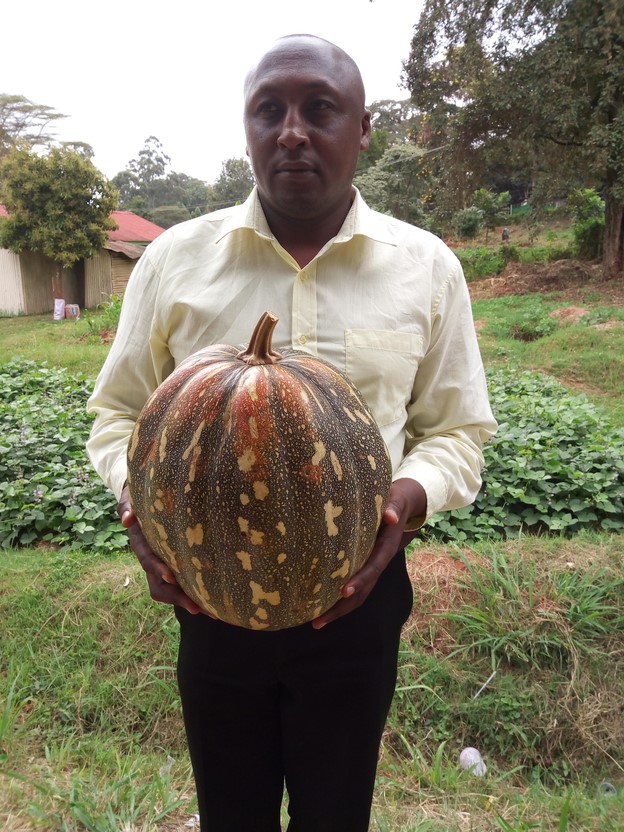 Some of the country’s pumpkin farmers are solving the problem of too much competition in the market, as smallholders have raced into pumpkin production, by buying or hiring processing machines to make oil and flour from the fruit, earning them far more than before and ending storage problems.
Some of the country’s pumpkin farmers are solving the problem of too much competition in the market, as smallholders have raced into pumpkin production, by buying or hiring processing machines to make oil and flour from the fruit, earning them far more than before and ending storage problems.
Inheriting the venture from her parents, Bernice Mwihaki, a pumpkin farmer from Kerugoya in Kirinyaga County used to split the fruit and sell the slices to customers at around Sh20 a piece while the seeds were castoff.
RELATED CONTENT:Oil firm buying canola, pumpkin, black and neem seeds from all-comers
Even after adopting the hybrid seeds of giant Israel variety she did not know that the fruit that weighs 10-15 kilos after a six-month maturity period could earn her more than Sh500 the price she sold it when raw until she got to learn how to produce other products from it during an agricultural show.
With her first Sh200,000 earnings in 2016 after harvesting about 11 tonnes from their three acres piece of plot, Mwihaki with her husband decided that in order to face off marketing challenges they had to purchase a processing machine.
‘’Before, raw pumpkins used to be of high demand and few farmers were in the venture then, but now there are many farmers growing them and the only way to avoid marketing and storage challenges is to process them and make more valuable products,’’ said Mwihaki.
RELATED CONTENT:Murang’a farmer builds milling factory to grind pumpkins into flour
Today, when they harvest their fruits, they cut them into smaller pieces, remove the seeds, dry them under shade to avoid the leaching of nutrients by direct sunlight before crushing the dried pieces of pumpkin using the machine and processing the seeds too.
She says, from six tonnes of the fruits, she can get up to 1,000 kilos of flour, while from five kilos of the crop, she can get 250 ml of pumpkin oil, which results to 10-20 bottles of 250 ml oil and 1,000 kilos of flour daily.
‘’We package the products under our brand name, Wilber Farm, and sell a 60 ml bottle of the oil at Sh500 and roasted pumpkin seeds at Sh400 per 100 grams,’’ said Mwihaki.
For William Githinji, another pumpkin farmer from Nyeri County, he is currently earning more than double the income he earned from selling the produce when fresh thanks to processing of the fruit seeds into oil, a practice he started in 2018.
“I borrowed the pumpkin production idea from a farmer who used to produce the crop while the demand of the fruits was high as many farmers had not picked it up. However, with time, many farmers have adopted the crop and there is market,” he said.
He heard from some of his customers that they were using pumpkins to make flour and oil, but having not yet bought his own machine, he is hiring one to crush dried pieces of pumpkin and process the seeds.
Like Mwihaki, Githinji can get up to 1,000 kilos of pumpkin powder from six tonners of pumpkins while from five kilos of the fruit, he can get 250ml of pumpkin oil.
‘’I sell a 60ml bottle of the oil at Sh500 He also sells roasted pumpkin seeds at Sh400 per 100g under the Green Patch Farm brand name.’’
He grows four varieties of giant pumpkins, being Israel Giant, Egyptian Giant, Equatorial Giant and Dollar.
Pumpkin is steadily rising as a superfood that is in demand with Kenyan health conscious consumers.
Gladys Mugambi, a nutritionist working with the Ministry of Health says pumpkins are low in calories, rich in iron, zinc, fibre and high in vitamin C and beta carotene, a precursor of vitamin A.
RELATED CONTENT:Nyeri entrepreneur buying pumpkin seeds from farmers
‘’This is one fruit that is promising high commercial returns to our farmers who are already or planning to venture into its production because it is good for a wide range of consumers from just ordinary persons to expectant women and to children,’’ said Mugambi.
Pumpkin seed flour is also used as a protein supplement in bread and cookies and can be used to supplement cereal flours in bakery products, soups, instant noodles and as a natural colouring agent in pasta and flour mixes.
Githinji can be reached on +254 719 504 157
















Comments powered by CComment